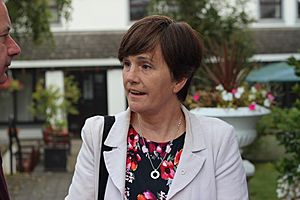Caitríona Ruane facts for kids
Quick facts for kids
Caitríona Ruane
|
|
|---|---|

Ruane in 2014
|
|
| Principal Deputy Speaker of the Northern Ireland Assembly | |
| In office 12 May 2016 – 19 October 2017 |
|
| Preceded by | Robin Newton |
| Succeeded by | Christopher Stalford |
| Minister of Education | |
| In office 8 May 2007 – 5 May 2011 |
|
| Preceded by | Martin McGuinness |
| Succeeded by | John O'Dowd |
| Member of the Northern Ireland Assembly for South Down |
|
| In office 26 November 2003 – 26 January 2017 |
|
| Preceded by | Mick Murphy |
| Succeeded by | Sinéad Ennis |
| Personal details | |
| Born | 19 July 1962 Swinford, County Mayo, Republic of Ireland |
| Political party | Sinn Féin |
| Residences | Carlingford, County Louth, Ireland |
| Website | SF election page |
Caitríona Ruane, born in 1962, is a politician from the Sinn Féin party. She served as the Principal Deputy Speaker of the Northern Ireland Assembly from 2016 to 2017. Before that, she was a Member of the Northern Ireland Assembly (MLA) for the South Down area from 2003 to 2017.
She also held an important role as the Minister of Education in the first government of Northern Ireland. This government was led by First Minister Ian Paisley and deputy First Minister Martin McGuinness. As Education Minister, she worked to change the school transfer exam, often called the "11-plus." She was replaced by John O'Dowd after the 2011 election.
Contents
Who is Caitríona Ruane?
Caitríona Ruane was born in 1962. Before becoming a politician, she was a professional tennis player. She even represented Ireland in the Fed Cup, which is a major international tennis competition.
Today, she lives in Carlingford, County Louth, Ireland. She is married and has two children. In the past, she helped organize big community events. For example, she was a director for the Féile an Phobail festival. She also chaired the St Patrick's Carnival Committee in Belfast.
Her Time as Education Minister
From 2007 to 2011, Caitríona Ruane was the Minister of Education for Northern Ireland. This was a very important job. She was in charge of schools and learning for all young people.
Changes to the 11-plus Exam
One of her biggest challenges was changing the "11-plus" exam. This test was used to decide which secondary school students would attend. Her predecessor, Martin McGuinness, had already planned to stop using this exam.
However, getting rid of the 11-plus was not easy. Many people and groups disagreed with the idea. The Democratic Unionist Party and the Social Democratic and Labour Party were against it. Also, about 30 grammar schools in Northern Ireland did not want the exam to be removed.
These schools even formed a group called AQE (Association for Quality Education). They created their own test to replace the 11-plus. There were also claims that a report showing public support for the old exam was delayed.
Views on Education
In March 2011, Caitríona Ruane made some statements that caused discussion. She believed that all students should have the chance to learn the Irish language. She also thought that education in Northern Ireland should be more like the system in the Republic of Ireland.
She stated that "the debate on academic selection is now over." This meant she felt the discussion about how students are chosen for schools was finished. However, not everyone agreed with her. John Hart, who represented grammar schools, said that many parents still cared about the issue. He felt the minister was not listening to their concerns.
See also
- Caitriona
 | Victor J. Glover |
 | Yvonne Cagle |
 | Jeanette Epps |
 | Bernard A. Harris Jr. |

